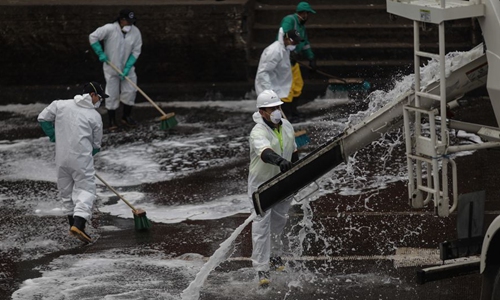
Members of staff disinfect a farm product market amid coronavirus pandemic in Bogota, Colombia, April 10, 2020. (Photo by Jhon Paz/Xinhua)
A group of enterprising young Colombians is developing an economical respirator using parts sold at a local market and 3D printing the rest, amid a global scramble for the medical devices needed to treat victims of the COVID-19 pandemic.
"Our device is made with materials you can get at the market, which makes it very easy to replicate," team member Carlos Morales told Xinhua, saying they were inspired by similar initiatives around the globe.
"We are not relying on parts that are exclusively for doctors or only available abroad, and that is a great advantage if you want to be able to make more," said Morales, manager of Abka 3D Printing, adding "we hope to make this device available as an 'open source'."
Morales calls the device an "automatic resuscitator," because even though "it helps people who are having trouble breathing ... it is not the same" as a traditional respirator. It comes complete with a computerized system for checking a patient's blood pressure, oxygen levels and other vital signs.
It could save hundreds of thousands of dollars, since it costs only 5 million Colombian pesos (about 1,300 US dollars) to build, while a traditional respirator costs between 40,000 and 70,000 US dollars on the international market, said Morales.
The team is located in the Colombian city of Cali, in Valle del Cauca department, and has garnered the backing of the Cali Chamber of Commerce, several private regional universities, and a slew of other private and state entities.
"The governor of Valle del Cauca, Clara Luz Roldan, donated 50 million pesos (about 13,000 US dollars) so we could finish our research and project as soon as possible," said Morales.
While the team has a "working prototype," the device is still very much in development, he said.
"We tested it out at the Javeriana University's hospital, and we now have new tasks for improving our device," such as adding a battery in case there is a power outage so the device can keep working, Morales said.
Team members hope to have a device ready in two weeks to submit to testing by the Colombia National Food and Drug Surveillance Institute (Invima).
Once it passes Invima's testing, "we will begin mass production," said Morales.
Colombia had 2,709 confirmed cases of the novel coronavirus and 100 deaths from the disease as of Saturday.
